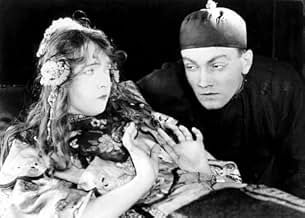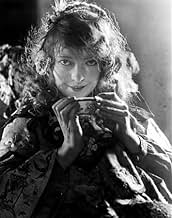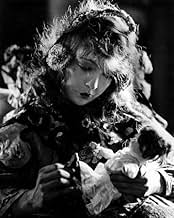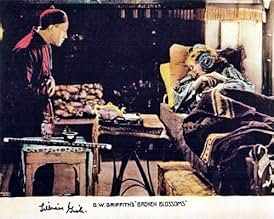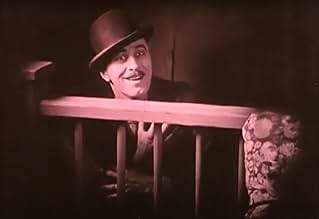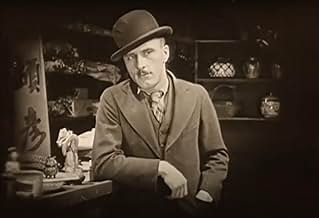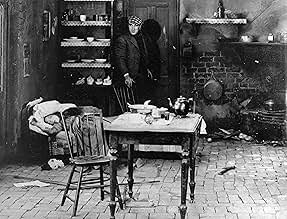CALIFICACIÓN DE IMDb
7.2/10
12 k
TU CALIFICACIÓN
Agrega una trama en tu idiomaA frail waif, abused by her brutal boxer father in London's seedy Limehouse District, is befriended by a sensitive Chinese immigrant with tragic consequences.A frail waif, abused by her brutal boxer father in London's seedy Limehouse District, is befriended by a sensitive Chinese immigrant with tragic consequences.A frail waif, abused by her brutal boxer father in London's seedy Limehouse District, is befriended by a sensitive Chinese immigrant with tragic consequences.
- Dirección
- Guionistas
- Elenco
- Premios
- 1 premio ganado en total
Lillian Gish
- Lucy - The Girl
- (as Miss Lillian Gish)
Richard Barthelmess
- Cheng Huan - The Yellow Man
- (as Mr. Richard Barthelmess)
Edward Peil Sr.
- Evil Eye
- (as Edward Peil)
Ernest Butterworth
- Secondary Role
- (sin créditos)
Frederic Hamen
- Secondary Role
- (sin créditos)
Wilbur Higby
- London Policeman
- (sin créditos)
Man-Ching Kwan
- Buddhist Monk
- (sin créditos)
Bobbie Mack
- Ringside Employee
- (sin créditos)
Moy Ming
- Minor Role
- (sin créditos)
Steve Murphy
- Fight Spectator
- (sin créditos)
George Nichols
- Police Constable
- (sin créditos)
Karla Schramm
- Burrows' Girlfriend
- (sin créditos)
Bessie Wong
- Girl in China
- (sin créditos)
- Dirección
- Guionistas
- Todo el elenco y el equipo
- Producción, taquilla y más en IMDbPro
Opiniones destacadas
Following the elaborate spectacles that were "The Birth of a Nation" and "Intolerance" D.W. Griffith seemed to have the formula intact for success. With broad sets, hundreds of extras, three hour epics, and tales told over years and even millenniums in the case of "Intolerance," the 90 minute "Broken Blossoms" would seem to have a handicap of sorts. It is but a simple morality tale involving three people that goes horribly awry. But true to Griffith form it works...and it works nearly perfect.
Gone are the visions of what formed countries, what creates intolerance, and the climaxes involving hundreds of people. "Broken Blossoms" is a mere story of forbidden love if such occurrences can actually be called "mere." And although the sets used to portray the foggy gloom and forbidding darkness of London's Limehouse district were indeed expensive, this was a film carried by its only three stars and one that relies totally on the telling of a story.
Richard Barthelmess plays Cheng Huan, a Buddhist missionary who now takes residence in Limehouse. His original intentions, to help the violent Anglo-Saxons understand pacifism, are subverted by his opium addiction. He runs a small shop in the fog of the city and it becomes his own depressed microcosmic world. The stunning Lilian Gish, who seemingly has no bounds as an actress or as an object of feminine beauty, plays Lucy, the daughter of an abusive alcoholic boxer. Donald Crisp plays this part so well that the lack of sound does not inhibit the volume of cruelty he enforces on his only daughter, nor our ability to feel her level of sheer pain and suffering.
Although all three of them may technically may be viewed as broken and products of their own respective worlds, when those worlds clash with each other and tragedy seems more likely, it is Gish who steals the show. Especially under Griffith's direction. And while Griffith may have already given the cinema more than its fair share of technological nuances with his first two features, he still manages to find subtle bits of direction that affect one's viewing of this sordid triangle: Gish's physical inability to smile and her seeking of solitude in something as simple as a flower cannot be emphasized enough as the film goes along.
Political historians may note that Griffith is up to his usual tricks of racism as it is portrayed in the Asian who is played by the white Barthelmess but this is unfounded. If anything, his character is uplifting, or at least attempts to be. One gets the feeling that his race does not impact the story's eventual ending despite what Crisp may bellow while drunk. Crisp's pleasure comes from Gish's pain and anyone, regardless of race, that tried to interfere would not have caused any sort of behavior change. Of course the Asian stereotypes of pacifism, opium addiction, and flowery imagery are played up to some degree but one can hardly argue over the degree of truth in them more than the story's beginning that sees drunken sailors duking it out at the shipyards over next to nothing. And it allows the film to have its ironic coda to boot.
In more detailed film classes, "Broken Blossoms" will get its share of time but overall Griffith will always have "Birth of a Nation" and "Intolerance" printed boldly next to his name with this film being more of a footnote. That is unfortunate because it stands up well for the time, involves excellent early character acting, and hits us closer to home...and to our heart.
The nutshell: I still believe this should be required viewing. The bigness of Griffith may be gone but he has aptly replaced it by creating atmosphere both in terms of environment and in people. The small story of insignificant lives trapped by their own measures suits Griffith, Gish, and Crisp extremely well...9/10.
Gone are the visions of what formed countries, what creates intolerance, and the climaxes involving hundreds of people. "Broken Blossoms" is a mere story of forbidden love if such occurrences can actually be called "mere." And although the sets used to portray the foggy gloom and forbidding darkness of London's Limehouse district were indeed expensive, this was a film carried by its only three stars and one that relies totally on the telling of a story.
Richard Barthelmess plays Cheng Huan, a Buddhist missionary who now takes residence in Limehouse. His original intentions, to help the violent Anglo-Saxons understand pacifism, are subverted by his opium addiction. He runs a small shop in the fog of the city and it becomes his own depressed microcosmic world. The stunning Lilian Gish, who seemingly has no bounds as an actress or as an object of feminine beauty, plays Lucy, the daughter of an abusive alcoholic boxer. Donald Crisp plays this part so well that the lack of sound does not inhibit the volume of cruelty he enforces on his only daughter, nor our ability to feel her level of sheer pain and suffering.
Although all three of them may technically may be viewed as broken and products of their own respective worlds, when those worlds clash with each other and tragedy seems more likely, it is Gish who steals the show. Especially under Griffith's direction. And while Griffith may have already given the cinema more than its fair share of technological nuances with his first two features, he still manages to find subtle bits of direction that affect one's viewing of this sordid triangle: Gish's physical inability to smile and her seeking of solitude in something as simple as a flower cannot be emphasized enough as the film goes along.
Political historians may note that Griffith is up to his usual tricks of racism as it is portrayed in the Asian who is played by the white Barthelmess but this is unfounded. If anything, his character is uplifting, or at least attempts to be. One gets the feeling that his race does not impact the story's eventual ending despite what Crisp may bellow while drunk. Crisp's pleasure comes from Gish's pain and anyone, regardless of race, that tried to interfere would not have caused any sort of behavior change. Of course the Asian stereotypes of pacifism, opium addiction, and flowery imagery are played up to some degree but one can hardly argue over the degree of truth in them more than the story's beginning that sees drunken sailors duking it out at the shipyards over next to nothing. And it allows the film to have its ironic coda to boot.
In more detailed film classes, "Broken Blossoms" will get its share of time but overall Griffith will always have "Birth of a Nation" and "Intolerance" printed boldly next to his name with this film being more of a footnote. That is unfortunate because it stands up well for the time, involves excellent early character acting, and hits us closer to home...and to our heart.
The nutshell: I still believe this should be required viewing. The bigness of Griffith may be gone but he has aptly replaced it by creating atmosphere both in terms of environment and in people. The small story of insignificant lives trapped by their own measures suits Griffith, Gish, and Crisp extremely well...9/10.
It is rather interesting to compare the silent D.W. Griffith BROKEN BLOSSOMS with its inspiration: the 1916 Thomas Burke short story The Chink And The Child, published in Limehouse Nights (Grant Richards Limited, London). Griffith has deliberately left out, added and changed parts of the story in his film. When Burke's collection of Limehouse stories was published it was feared that the book would be barred by the censor. Recently books by Vere Stacpoole (The Blue Lagoon) and D.H. Lawrence (The Rainbow) has been suppressed, as 'frankness in fiction was frowned upon...' (John Gawsworth - Foreword to: The Best Stories of Thomas Burke, Phoenix House, London, 1950). There were enough worrying themes in the story: its sadism, the utterly impossible interracial love affair and the girl's youth. In Burke's story Lucy is found in an opium joint, where a prostitute has taken her to make a profit out of the virgin. Cheng rescues the 'alabaster Cockney child' - she is only twelve - to bring her '...love and death.' Burke's poetic prose is not always graphic: «He took her hand and kissed it; repeated the kiss upon her cheek and lip and little bosom, twining his fingers in her hair. Docilely, and echoing the smile of his lemon lips in a way that thrilled him almost to laughter, she returned his kisses impetuously, gladly. ... And she was his; her sweet self and her prattle, and her birdlike ways were all his own. Oh, beautifully they loved. ...» Nevertheless elsewhere Burke clarifies the nature of their relation as « It may be that he forgot that he was in London and not in Tuan-tsen. It may be that he did not care. Of that nothing can be told. All that is known is that his love was a pure and holy thing.» Griffith's additions vary from Lucy's artificial smile to Cheng's religious mission. The Christian missionary is also Griffith's invention. He has a dig at Western Christian morality sending missionaries around the world while there's still enough to be done in Battling Burrows's own home town. Near the end Cheng kills Battling Burrows with a handgun as in any American western. In Burke's London Limehouse nights a snake deals with Battling Burrows. Was such a venomous revenge not personal enough to Griffith's American taste?
Turning away from the epic scale of his quintessential movies, Birth of a Nation and Intolerance, director D. W. Griffith turned to an altogether smaller and more intimate story in 1919. Instead of telling a vast tale spanning millennia and featuring a cast of thousands, he focused his attention on the tragic interplay between just three people: a Chinese immigrant to London (Richard Barthelmess), a young waif with whom he develops a brief but touching relationship (Lillian Gish), and her brutish father (Donald Crisp). It's been suggested this was another sop by Griffith to those who had accused him of being a racist due to the content of BoaN although, while Bathelmess' Chinese immigrant is a completely sympathetic character, the thoughtless racist attitudes that were commonplace back then are still very much in evidence. For example, the movie's secondary title is 'The Yellow Man and the Girl', and during a tender love scene, Gish's Lucy says to him: "Why are you so good to me, Chinky?" which tends to break the mood just a tad.
Griffith's trademark use of tiny gestures and changes of expression is very much in evidence in the performances of Barthelmess and Gish, while Crisp, who is barely recognisable as the kindly patriarch of countless 40s flicks, paints a broader picture of the loutish Battling Burrows. This counterpoint between screen father and daughter works well, stressing the fragile nature of Gish's waif, while emphasising the misery of her dependence upon her uncouth father. Barthelmess, meanwhile spends much of his time gazing miserably at the bleakness of the world around him as his character tries to lose himself in a haze of opium after failing to spread the word of peace. Chen seems to be moving through a dream for much of the film, passively allowing himself to be buffered by the world, and only shaking himself from his torpor when Lucy almost literally falls at his feet. This scene, in which Lucy and Chen first meet, is wonderfully atmospheric and beautifully framed and is, strangely, the prelude to the film's weakest segment. Having set the scene beautifully and created a great atmosphere, Griffith allows proceedings to slip into melodrama. While Battling's discovery of Lucy's new friendship is melodrama of the most Victorian kind, the relationship between the two potential lovers goes nowhere which, while perhaps true to the film's title, leaves the story struggling for momentum. Lucy enjoys a few hours of being spoiled by Chen the first time in her life that she ever has been, but there is very little interaction between them, and Chen's apparent consideration of forcing himself on Lucy before finally kissing her sleeve really doesn't ring true at all. In fact, the scene looks as if it were added almost as an afterthought to inject a little suspense.
Nevertheless, BROKEN BLOSSOMS is another example of one of the world's greatest directors operating at somewhere close to the top of his game. In another few years, Griffith's Victorian viewpoint would look horribly outdated to the Roaring Twenties crowd. There were still more classics to come, but in terms of technical and creative accomplishment he had already peaked.
Griffith's trademark use of tiny gestures and changes of expression is very much in evidence in the performances of Barthelmess and Gish, while Crisp, who is barely recognisable as the kindly patriarch of countless 40s flicks, paints a broader picture of the loutish Battling Burrows. This counterpoint between screen father and daughter works well, stressing the fragile nature of Gish's waif, while emphasising the misery of her dependence upon her uncouth father. Barthelmess, meanwhile spends much of his time gazing miserably at the bleakness of the world around him as his character tries to lose himself in a haze of opium after failing to spread the word of peace. Chen seems to be moving through a dream for much of the film, passively allowing himself to be buffered by the world, and only shaking himself from his torpor when Lucy almost literally falls at his feet. This scene, in which Lucy and Chen first meet, is wonderfully atmospheric and beautifully framed and is, strangely, the prelude to the film's weakest segment. Having set the scene beautifully and created a great atmosphere, Griffith allows proceedings to slip into melodrama. While Battling's discovery of Lucy's new friendship is melodrama of the most Victorian kind, the relationship between the two potential lovers goes nowhere which, while perhaps true to the film's title, leaves the story struggling for momentum. Lucy enjoys a few hours of being spoiled by Chen the first time in her life that she ever has been, but there is very little interaction between them, and Chen's apparent consideration of forcing himself on Lucy before finally kissing her sleeve really doesn't ring true at all. In fact, the scene looks as if it were added almost as an afterthought to inject a little suspense.
Nevertheless, BROKEN BLOSSOMS is another example of one of the world's greatest directors operating at somewhere close to the top of his game. In another few years, Griffith's Victorian viewpoint would look horribly outdated to the Roaring Twenties crowd. There were still more classics to come, but in terms of technical and creative accomplishment he had already peaked.
10drpax
"In this scarlet house of sin, does he ever hear the temple bells?" Broken Blossoms is the movie I use to introduce people to silent film who only know it from Chaplin shorts or Birth of a Nation. It is one of the most sensitive movies ever made, in my opinion, and is usually overlooked in any top 100 movie listing. I fear the oversight is due to the listers not having actually seen it.
The version I have--which is now sadly out of print--is the Thames Video version with Lillian Gish's introduction. It is also the one with the original Louis Gotshalk score, pieces of which are sometimes heard on other versions, but the impact of the full orchestral Gotshalk score is overwhelming on an already exquisite film. If you have a chance to see this version, by all means do so.
In answer to a question in another posting, the movie WAS originally tinted--it was part of the "epic poetry" attempt and was quite common with a lot of Griffith work--even back to "A Corner in Wheat".
While I am an immense Gish fan, a lot has already been said about Miss Lillian in the other comments, so I will concentrate on Dick Bartlemess as Chen Huan. The quote above accompanied by his sad look as he leans against the wall of his curio shop tell it all: wrecked youthful enthusiasm--his despair only temporarily abated by the "pipe" in the Limehouse opium dens. His dreams of youth, all packed away in his garret, are only brought out when the one thing that gives him hope that is goodness amidst all the squalor stumbles into his shop.
Only after Lucy arrives can Chen Huan allow himself to dream--to return to golden days of learning, beauty and goodness and ideals. He literally places his dreams of his lost youth on the trembling body of Lucy, but it such a pristine ideal he dare not "defame" it, or it too will disappear like all his other dreams. He must observe it from afar--almost ephemeral. He knows what Hell is like (even before he was shown the booklet by the Christian Brothers). His hell is his lost heart, his lost love. "Bits and pieces of his shattered life." Almost invariably when I find someone to share the movie with me, they are amazed how well it is made and how well it's core story stands up to today. The particulars of Chinese, Cockney and London are not the point; it is a story of hope and despair, of lovers and dreamers. A mature story for a mature audience.
I often wonder if it could be made today. As open as we think we are, I wonder if the basic story could be told again. No matter--it's been told--excellently
The version I have--which is now sadly out of print--is the Thames Video version with Lillian Gish's introduction. It is also the one with the original Louis Gotshalk score, pieces of which are sometimes heard on other versions, but the impact of the full orchestral Gotshalk score is overwhelming on an already exquisite film. If you have a chance to see this version, by all means do so.
In answer to a question in another posting, the movie WAS originally tinted--it was part of the "epic poetry" attempt and was quite common with a lot of Griffith work--even back to "A Corner in Wheat".
While I am an immense Gish fan, a lot has already been said about Miss Lillian in the other comments, so I will concentrate on Dick Bartlemess as Chen Huan. The quote above accompanied by his sad look as he leans against the wall of his curio shop tell it all: wrecked youthful enthusiasm--his despair only temporarily abated by the "pipe" in the Limehouse opium dens. His dreams of youth, all packed away in his garret, are only brought out when the one thing that gives him hope that is goodness amidst all the squalor stumbles into his shop.
Only after Lucy arrives can Chen Huan allow himself to dream--to return to golden days of learning, beauty and goodness and ideals. He literally places his dreams of his lost youth on the trembling body of Lucy, but it such a pristine ideal he dare not "defame" it, or it too will disappear like all his other dreams. He must observe it from afar--almost ephemeral. He knows what Hell is like (even before he was shown the booklet by the Christian Brothers). His hell is his lost heart, his lost love. "Bits and pieces of his shattered life." Almost invariably when I find someone to share the movie with me, they are amazed how well it is made and how well it's core story stands up to today. The particulars of Chinese, Cockney and London are not the point; it is a story of hope and despair, of lovers and dreamers. A mature story for a mature audience.
I often wonder if it could be made today. As open as we think we are, I wonder if the basic story could be told again. No matter--it's been told--excellently
The subjects this film deals with are ugly, but the whole thing is done in a beautiful way.
Subjects dealt with are racism, poverty and the reasons why.
The way Griffith deals with these subjects is the contrasts settings. Look at the room above the Chinaman's shop: opulent, festooned with the finest oriental silk. Compare that with the stark squalor of the abode of Lucy and her bruiser of a father. Then there is the education and sophistication of the orientals compared to the simplistic, ill-thought-out racial prejudice of Battling and his cronies.
I also enjoyed the boxing match. Very realistic - not the fantastic nonsense of your Rocky-type bout where a man all but beaten to a jelly suddenly pulls some heavy punches from nowhere and wins the fight.
The acting, as has been mentioned elsewhere, is terrific from all three of the principal characters. Also, their characters are well-drawn. Even Battling Burrows - complete with cauliflower ear - is more than a mere heavy: he boxes for a living, he drinks, he lives in a slum with few worldly possessions. Why?
I find it hard to believe that the films they make nowadays are nowhere near as good as this. Whatever happened to progress?
This film spawned the famous song "Limehouse Blues."
Subjects dealt with are racism, poverty and the reasons why.
The way Griffith deals with these subjects is the contrasts settings. Look at the room above the Chinaman's shop: opulent, festooned with the finest oriental silk. Compare that with the stark squalor of the abode of Lucy and her bruiser of a father. Then there is the education and sophistication of the orientals compared to the simplistic, ill-thought-out racial prejudice of Battling and his cronies.
I also enjoyed the boxing match. Very realistic - not the fantastic nonsense of your Rocky-type bout where a man all but beaten to a jelly suddenly pulls some heavy punches from nowhere and wins the fight.
The acting, as has been mentioned elsewhere, is terrific from all three of the principal characters. Also, their characters are well-drawn. Even Battling Burrows - complete with cauliflower ear - is more than a mere heavy: he boxes for a living, he drinks, he lives in a slum with few worldly possessions. Why?
I find it hard to believe that the films they make nowadays are nowhere near as good as this. Whatever happened to progress?
This film spawned the famous song "Limehouse Blues."
¿Sabías que…?
- TriviaThe film was produced by D.W. Griffith for Adolph Zukor's Artcraft company, a subsidiary of Paramount Pictures. However, when Griffith delivered the final print of the film to Zukor, the producer was outraged. "How dare you deliver such a terrible film to me!" Zukor raged. "Everybody in the picture dies!" Infuriated, Griffith left Zukor's office and returned the next day with $250,000 in cash, which he threw on Zukor's desk. "Here," Griffith shouted, "If you don't want the picture, I'll buy it back from you." Zukor accepted the offer, thus making this the first film released by United Artists, the production company formed in 1919 by Mary Pickford, Charles Chaplin, Douglas Fairbanks, and Griffith. It was a remarkably successful film, both critically and at the box office.
- ErroresThe intertitles state, "The Buddha says, 'What thou dost not want others to do thee, do thou not to others.'" It was actually not the Buddha but Confucius' teaching.
- Citas
Lucy Burrows: Don't do it, Daddy! You'll hit me once too often - and then they'll - they'll hang yer!
- ConexionesFeatured in The Philco Television Playhouse: The Birth of the Movies (1951)
Selecciones populares
Inicia sesión para calificar y agrega a la lista de videos para obtener recomendaciones personalizadas
- How long is Broken Blossoms?Con tecnología de Alexa
Detalles
- Fecha de lanzamiento
- País de origen
- Idioma
- También se conoce como
- Broken Blossoms
- Locaciones de filmación
- Productora
- Ver más créditos de la compañía en IMDbPro
Taquilla
- Presupuesto
- USD 88,000 (estimado)
- Tiempo de ejecución1 hora 30 minutos
- Mezcla de sonido
- Relación de aspecto
- 1.33 : 1
Contribuir a esta página
Sugiere una edición o agrega el contenido que falta

